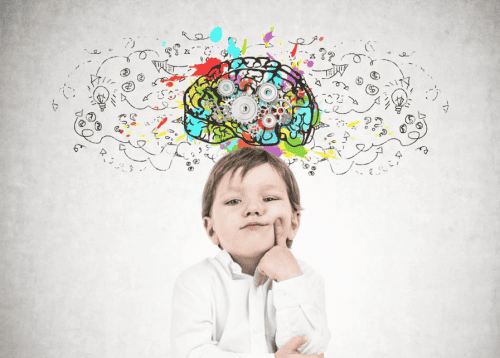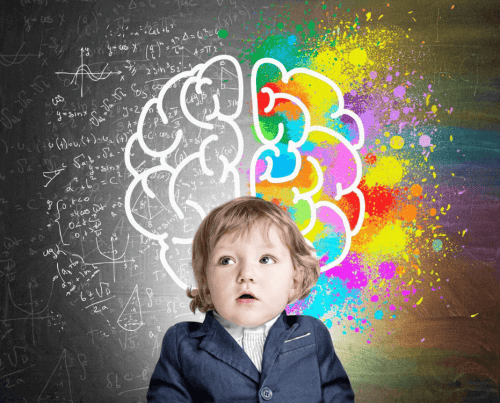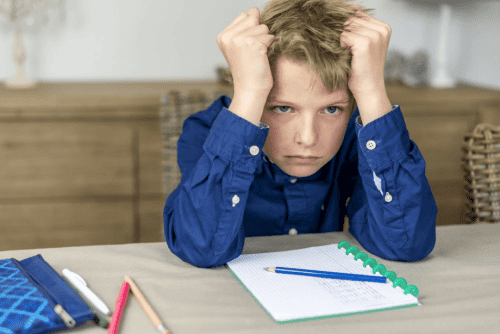Everyone is born with a unique blueprint. Nobody thinks, feels or perceives the world the same way as anyone else. But everyone has the same emotions. Every child is born a unique, independent thinker. How they experience the world shapes who they become as adults.
As children we inherit the fabric of our brains from either our mother or father’s side of the family. The brain’s fabric is like calico or silk. It is tolerant or intolerant to stress. For example, if you put tension on calico it doesn’t rip but put the same tension on silk and it rips easily. When your child is born, their brain fabric is either one of resilience or one of emotional sensitivities.
Your blueprint contains genetic information from both sides of your parents, but your brain fabric is either from your mother side or father’s side. Have you ever caught yourself doing something your mother or father used to do?
Born with stress patterns
Babies are born with stress patterns when mothers are stressed while their baby is developing in the womb or when the birth was stressful. Many women work until near full term and then go home to take care of a family. Add to this carrying a developing baby in the womb, it is a stressful time for a lot of women. So babies can have stress patterns when they come into this world.
You spend the first few years nurturing your child at home until it comes time to let go and send them to school. They do well at school but then you notice changes. Small at first but they become more troubling. Homework seems to be hours a night, and your child is irritable all the time. With sport, music and other activities after school, they should sleep well at night. They start having trouble sleeping or wake up tired because their brain isn’t in recovery sleep. You become worried because your child spends more time in their room than with the family.
Other signs of stress are reactive, aggressive children. A child having a meltdown. These are all signs their brain is not coping. Shy and emotionally sensitive children may be stressed or not coping with unfamiliar experiences. Moody behaviour, disobedience, anger, emotionally reactive, depressed, anxious, insecure, fearful and worried are all sign of stress in children. We accept these as normal behaviours but they are signs your child is feeling stressed.
Adults forget kids get stressed too. They worry about the pressure of schoolwork, pets, family and getting on with friends. When parents divorce or someone close dies, they suffer stress just like adults.
Children are unique
From birth to 8 years old, a child’s brain, because it’s still in early development, relies on its genetic history to help it create patterns of behaviour that support the child’s emotional and psychological reality. These patterns also determine the way your child will eventually learn and process information.
A child’s logical brain and mind starts to develop after the age of eight so, until then, your child learns through examples, stories and play.
Every child born has a unique thinking, thought and perception filtering system. Whether your child is a creative or logical learner depends on how easy it is for them to embrace the demands of school and study.
Children recover quickly from stress when they feel nurtured and supported at home. A lot of the problem comes when the child leaves home to go to school. It is at a time the child’s brain is biologically growing which adds stress. On top of all this, they are starting to learn a whole lot of information.
School becomes more stressful in high school. Kids face the realties and pressures of life catching up with them. Stress builds through each year until they get to the final year. Soon they have to make decisions about going to work or more school on top of the pressure of passing exams
Looking back in history, people’s skills were the basic skills of life. People only learned enough to sustain themselves in the community. Now, in the 21st century, it is all about information. And the brain is not equipped to learn so much information at such an early age.
Children have different learning styles
Children have different learning styles: creative and logical.
Creative children have trouble conceptualising complex information as they look at it with creative thought. Creative children have brains genetically engineered to learn through the mind instead of the brain. They are mind learners. Using their imagination to conceptualise new complex learning can add enormous stress to your children’s brain. And if your child finds it difficult to relate to facts and figures in the initial few years of early childhood learning, they will find school and study stressful and challenging.
Children who breeze through school have brains that are logical and factual. They process information in a methodical way.
Mind learners
I was one of these children. I was a mind learner and struggled with complex concepts that didn’t have a building block that supported imagination learning. Because of this I grew up hating school, feeling dumb and really inadequate when it came to my IQ. I struggled with English and maths because these two styles of learning were more conceptual. My parents didn’t read to us. They frowned on supported reading as a base for a child learning. This was my first exposure to school and, unfortunately, the system didn’t support children who didn’t adapt to the structures of learning.
You can tell if your child is a mind learner. They are always, constantly drifting off in their thoughts and imagination.
Many children of the 21st century are mind learners as the planet is no longer a world that stays the same. Our world changes rapidly. It is the imagination of the next generation that will see our planet evolve into a futuristic world. A lot of schools don’t cater for mind learners so your child can be left feeling not good enough compared to other children.
Mind learners are generally distracted thinkers because their mind is always in creative thought. When a concept is being taught, their mind adds another dimension to the concept. This may not make sense to the teacher when the child gives feedback about what they have just learned. This can cause the child and the teacher a lot of emotional frustration because the child’s needs aren’t being met and the teacher’s responsibilities are being fulfilled.
Studying when stressed
A lot of children have to study when their brains are stressed. I had a distressed 14-year-old say to me, “If I don’t pass my exams, I won’t get a good paying job when I leave school”. Not only are kids under learning stress, they are under performance stress and in economic survival. They should not have to worry about this at 14 years of age.
Lazy learners
Children classed as lazy learners are often simply not grasping new concepts. So they get bored because they don’t get it. Bored children become destructive. They do things to amuse themselves and become disruptive in the classroom. Their brains have a different way of learning or they are so stressed that learning becomes difficult.
I know children lazy at school because of boredom. Put them on a basketball court and they will play all day. They are not lazy in nature. It is only their brain that cannot conceptualise complex ideas.
Minds develop differently
There is no such thing as an unintelligent child. The brain is highly intelligent. Because every child is unique, they have a different learning style and way they process information. A child’s learning style dictates how fast their learning pathways grow. Some children are late developers so do not develop as fast as other kids.
Every generation adapts to the changes of the 21st century. Their minds develop differently than they did in the past. Look at how people’s mindsets are completely different from generation to generation. As we evolve, children evolve at a different rate to become the new generation of leaders.
Homework stress added
Teens spend 6 hours a week studying. That is a whole extra day of school a week instead of enjoying playtime. The stress of growing up and school pressures can be overwhelming. But children who have good relationships with teachers and parents do better at school and have happier lives.
Research shows students can get too much homework from the time they start school until they finish. As a general guideline, kids in prep should only get 10 minutes a night and then it increases by 10 minutes a year.
But a 2015 study showed children in primary school were getting more homework than this. Kindergarten children spent 25 minutes a night on homework where the standard recommends no homework. Contributing editor of the study, Stephanie Donaldson-Pressman said extra homework can lead to family stress when parents are not confident they can help their children. Homework is not beneficial at this age. Children learn through play and experiences. She said that a lot of research shows too much homework at this age was “detrimental to their attitude about school, their grades, their self-confidence, their social skills, and their quality of life.”
According to an OECD 2017 report, students are anxious about studying and exams. Around 59 percent feared how hard a test would be and 66 percent felt stressed about failing. Girls were more stressed about school than boys. This is too much stress for a child’s brain. Anxiety about school, studying and exams can have a negative impact on performance and mental health.
When a child is stressed, it affects their memory. They can’t concentrate, feel confused and do not process information. So a child may get stressed when faced with conceptualising complex information. The problem is the school environment that has to cater to the majority of students. There is not the budget or infrastructure for children who learn differently to the mainstream system.
If school is stressing your child out, it is a sign the brain is not coping. Schools cannot cater to individual learning styles. It is not practical for an education system. But more and more kids feel performance stress as they study to pass exams. My Ultimate Performance Accelerator and Exam Stress Recovery helps the brain cope with mainstream learning.
Sources of child stress
Sources of child stress can include separation from parents when young. Then school, academic and social pressures as kids grow up. The problem today is many children do not have the time to play, be creative or relax at the end of the school day.
A lot of children have activities scheduled after school: sport, dance, music. Listen when your child complains about all the things they do. This is a sign of stress so talk to them about dropping an activity to relieve their anxiety.
Children are also affected by external sources. World news, your problems, the problems of friends and family. When you have money problems children worry as they pick up on your anxieties. And world news is full of events that cause fear and a feeling of being unsafe. Then they may have the stress of parents breaking up or a death in the family. Also take into account what may not stress you out could be a major source for your children. Children need parents to acknowledge their feelings.
Signs of stress in your child
It is not always easy to tell when your child feels stressed. Signs include:
- trouble concentrating on learning
- spending a lot of time alone
- acting out
- headaches
- sudden behavioural changes
- mood swings
- unable to sleep
- stomach aches
- bedwetting
- withdrawn
- starting to lie
- defying you
- becoming a bully.
Young children stress out too. Signs of stress include:
- sucking the thumb
- twirling their hair
- having nightmares
- overreacting to minor things
- not doing well at school
- becoming clingy.
How to reduce your child’s stress
It is hard seeing your child stressed out. You may feel helpless.
Spend quality time with the kids every day. Make sure they eat and sleep well to help them cope better. Be available to your children when they want to talk. Let them be when they don’t want to talk. Take them out and do something fun to take their mind off their troubles.
Ask your child what’s causing their stress. Together you can come up with solutions depending on the causes. Maybe it is too many after school activities or struggling to understand school work.
No matter the age of your children, spending quality time together is important. Make time at the end of your busy day to show interest in what they have to say. Showing interest lets the kids know they matter to you.
Here are a couple of quick things to try.
Make them laugh
Make them laugh to relieve their stress. Tell jokes, be silly together. Laughing is a great stress reliever and makes kids feel better. There is nothing better than sharing a laugh with your kids.
Teach deep breathing
Teach your child deep breathing. It will help them relax when feeling stressed.
To practice deep breathing, get comfortable with your child. Sit upright, on your heels or cross-legged. Or lie down. Put a hand on the stomach and the other on the chest. Breathe in slowly for four counts and breath out slowly through your nostrils for four counts. Concentrate on the rise and fall of the chest and stomach. The stomach moves out when you breathe in and the and in when you breathe out. Put a stuffed toy on your child’s stomach so it moves up and down with their breathing. Practice this for a couple of minutes to reduce stress and help refocus.
Play together
Take time out to play with the kids every day. Play your favourite board game. Teach them to play a new game. Go to the park and play on the play equipment, throw a ball around. Go to the beach and build a sandcastle together. Enjoy spending time doing fun things with your kids. It is a good way to bond and connect with each other.
Helping kids cope
Kids often do not want to talk about what is stressing them. You can try talking about what stresses you and let them know they can talk when they are ready. But you may need professional help if you cannot get to the heart of the matter.
Contact us to find out how I can help you with your child’s stress. It does not matter where you are in the world. We can work with you in our Spas, over the phone or via Skype. Bookin today for my Emotional Empowerment Program. I have an introductory offer for just $79 so you can start your journey towards a stress-free life. We can help you to replace stress with a balanced, happy life.







